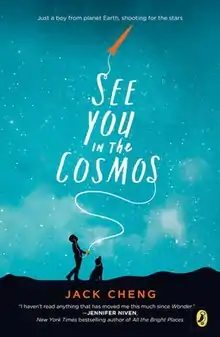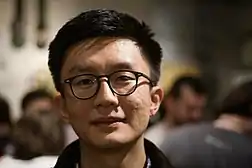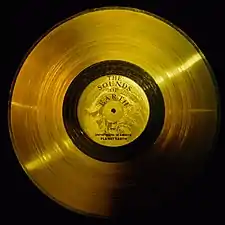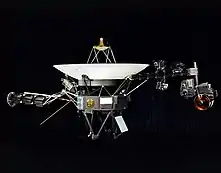See You in the Cosmos
See You in the Cosmos is a 2017 epistolary Bildungsroman novel by Chinese-American author Jack Cheng. It is his first juvenile book and his second book. Written in the style of a transcription, it follows astronomy-loving pre-teen Alex Petroski as he embarks on a journey to understand the life of his late father, whilst recording sounds on his iPod to launch it to space for extraterrestrial beings.
 First edition cover | |
| Author | Jack Cheng |
|---|---|
| Translators |
|
| Cover artist | Jason Henry |
| Country | United States |
| Language | English |
| Genre | Bildungsroman, juvenile |
| Set in | United States |
| Publisher | Dial Books (US) Puffin Books (UK) |
Publication date | February 18, 2017 |
| Media type | Paperback, hardback, Audio CD, e-book |
| Pages | 320 |
| ISBN | 978-0-399-18638-7 (paperback) |
| OCLC | 1077591862 |
| 813.6 | |
Cheng composed the initial idea for the novel in 2012, after seeing a photo of the Pale Blue Dot, intertwined with remembrance of an episode of Radiolab. He was also inspired by a road trip he took in 2013. Although it was published as a juvenile book, Cheng did not write the manuscript for young readers: he incorporated adult or sensitive content throughout, such as sex, violence, and mental illness.
The novel received a generally positive reception upon its release, as well as several accolades. Many reviewers praised the style of narrative, as well as Alex's character, regarded to be memorable and resonating, although the epistolary style is noted to have some consequences. The audiobook version of the novel was saluted for its naturalness and faithfulness to the written version.
Background
Jack (born Yuan)[note 1] Cheng was born in Shanghai, China, in around 1984, and immigrated to Troy, Michigan, when he was five, with his younger brother. After a failed attempt to enter the University of Michigan Business School, he attended classes about communications, and went to New York City in 1998 for an advertising internship. He also became a copywriter there. Feeling that he "was losing this artistic, entrepreneurial drive", he moved to the freelance industry in late 2008.[2]

In 2013, after releasing his debut novel These Days, a romance novel[3] based on Cheng's experience as a Midwestern tech worker based in New York,[1] with funds from Kickstarter, he started writing See You in the Cosmos.[2] He got the idea for the novel in 2012 at his parents' house during a Thanksgiving gathering.[3] His brother's room had Pale Blue Dot, a 1990 photograph of Earth from 6 billion kilometers away taken by Voyager 1, on his shelf. Seeing the photograph reminded him of an episode of Radiolab about the photograph. The next day, he instantly had the idea of the novel in his head and worked on it immediately.[2] He also cited "ambient sound" as one of the bases of the story.[4] Cheng recalled via WUOM that part of the novel was based on a road trip he took in the Southwestern United States in mid-2013, where he mimicked his late father who once took a Greyhound Lines service from Los Angeles to Detroit, wanting to know the full story of his family "and how I came to be where I am".[5]
As the novel included elements detailing social work and child protective services, Cheng stated in the novel's acknowledgment section that he researched the topic with the help of several friends. He also credited various people for "guiding me through unfamiliar territory, and for helping peel open the layers to find what the book was really about".[6]:319–320
Although he is an Asian-American, Cheng did not create the novel on the basis of Asian-American representation. He said: "I think we’re still at the beginning where in America the stories written by Asian Americans form only a tiny part of their experience [of growing up in America]. There are other experiences where our 'Asian-ness' doesn't necessarily have a significant role in the story, and See You in the Cosmos is one example". He hoped that minority writers dilute their idea scope to a wider range than just their ethnicity.[4]
Throughout the writing process, Cheng did not have any insights on what the novel's target demographic would be, saying that "It was more the story seemed interesting and the character happened to be eleven".[2] After submitting the manuscript to his literary agent, Barcelonan Jessica Craig, she told Cheng that this should be submitted as a young adult novel, and copyedited it to make it more friendly towards the 10–14 age range. Quantitatively, not many further edits were done; however, there are still some: Cheng thought of the manuscript as a "lucid dream", where after witnessing it he then "go back and make sense of it".[3] Cheng compared the novel, having been a juvenile book but with adult themes, with works like The Little Prince and Spirited Away, which "have these qualities of meaning one thing for a kid and then have this depth and complexity for the adult".[2]
Plot
11-year-old European-Filipino-American[note 2] Alexander Petroski lives in fictional Rockview, Colorado, with his mother. His brother, 24-year old Ronnie, is in Los Angeles to work as a sports agent. Alex also has a puppy, Carl Sagan (taken from the name of his idol astrophysicist). Alex has an iPod spray-painted in gold, on which he has been busy recording various audio to recreate the Voyager Golden Record, and launch his homemade rocket, Voyager 3, at the Southwest High-Altitude Rocket Festival (SHARF).
Alex embarks with Carl Sagan to travel to Albuquerque, New Mexico, where the festival is located. Befriended on the train, martial arts master Zed, who after taking a vow of silence only communicates with a chalkboard, brings him to SHARF, where his roommate friend Steve will be launching a rocket, which their roommate Nathan designed. Miserably, Alex's rocket crashed seconds after launch. Luckily, his iPod is not damaged.
Alex receives an Ancestry.com email that his dad, Joseph David Petroski, is located in Las Vegas, Nevada. Having little knowledge of his dad, Alex begs Steve to drive him there; Ronnie permits, and Steve accepts. At Vegas, Carl Sagan goes missing; the search for him prompts Alex to find his dad and ask for help. Alex asks a woman named Terra if Joseph David Petroski is around; it is revealed that Terra is Joseph's daughter, and that she is Alex's half-sister. Terra was born to Joseph and his first wife Donna, and after Joseph's death, Donna moved on to another man, Howard. Alex and Terra got along quickly, mostly due to Alex's ardent attitude.
They go to Los Angeles with Zed and Steve. Steve plans to confess his feelings for Terra (although he has a girlfriend), but seeing Nathan talking with Terra led him to believe that they are in a relationship, and an argument ensues. After punching Nathan, Steve belittles Alex, saying that creating a working rocket requires time, money, and teamwork. Alex passes out, and Terra cuts Steve off from Alex, sadly leaving Zed and Nathan.
Terra brings Alex home. Upon their arrival, Alex's mother is not present. Alex climbs up a ladder to look if his mother is around the house, but he collapses and is hospitalized. When Alex is discharged, everyone but him learns that Alex's mother, Karen, has long suffered from schizophrenia. After days of uncertainty, Ronnie reveals it to Alex. He also reveals that Joseph was an abusive husband, however Karen's disorder camouflaged his malice and considered him a good man. He traveled frequently for work, where he got intimate with Donna and made Terra. Joseph later died in an accident. Painted by her disorder, she grieved: placing Joseph's remains in her room and acting cold-blooded. Still enraged, Ronnie threw the ashes away at a construction site. Viewing it as a cursed town, Ronnie left Rockview and pursued his own life.
Social worker Juanita is tasked to decide whether foster care will be in Alex's best interest, but Ronnie rejects this, saying that he will stay in Rockview with Alex. Alex, Ronnie, and Terra gather and enjoy times together. Alex is invited by space organization CivSpace, which has been hearing about Alex's story, to witness the fictional Cloud 9 rocket carrying a satellite to Mars from Cape Canaveral Space Force Station. As the rocket lifts, Alex realizes that through the love and help of others, his dream of lifting Voyager 3 up will come true.
Characters
- Alexander Petroski— a pre-teen boy who lives in the fictional town of Rockview, Colorado. Although he is considered immature in terms of age, he considers his mental age to be around 13, and has a pet peeve of others calling him a kid. Most of his favorite songs are those included in the Voyager Golden Record. Alex considers himself a pacifist. He has a part-time job at a gas station owned by Mr. Bashir, assigned to stack magazines at a stand.
- Carl Sagan— Alex's pet puppy. Alex found him at a parking lot in Safeway; Ronnie initially opposed the idea of a pet as it may impact Alex and Karen financially and routinely, however Alex insisted with his perseverance. Carl Sagan once got lost in the nightlife of Las Vegas, but was found.
- Ronnie "RJ" Petroski— Alex's older brother
- Karen— Alex's mentally-disordered mother
- Joseph David Petroski— Alex's dead father. He was a European-American, whose family arrived from Europe in 1870. He later died in an accident.
- Terra— a 19-year-old female living in Las Vegas. She has a boyfriend named Brandon, but has no romantic feelings for him.
Style and themes
The epistolary novel is written in the style of a transcription of audio recordings from an iPod. Each chapter is prefixed "New Recording" and suffixed with a numeral; in total, there are 52 recordings.[note 3] Below the chapter header, the recording's duration is written. These recordings were described to be recorded along with the novel's plot. Due to the weaknesses of auto-transcription, there are no quotations in speeches.[6]
According to a review in Children's Literature Association Quarterly, an academic journal published by the Johns Hopkins University Press, the core themes of See You in the Cosmos are "correspondence and care". After encapsulating the novel's narrative, it concludes that "Reading Alex's missives [...] gives us insight into a child's desire for connection, the value of correspondence (in whatever form it takes), and the potential for the things that we write and say today to inform the understandings of future audiences. Just as significantly, they reveal the importance of having our dreams supported by those around us".[7]
Publication history

See You in the Cosmos was released at Detroit's Pages Bookshop on February 28, 2017. The Detroit Free Press observed that 40 guests came to the gathering, where Cheng also read several excerpts from the book. During its national release, it was shipped to every English-speaking nation according to Cheng, with the German edition released the following week, and the French and Spanish editions later that year.[2]
At the same time, a six-hour audiobook version of the novel was published by Penguin Books,[8] which also published the written version alongside Dial Books (US) and Puffin Books (UK).[3] The audiobook stars Kivlighan de Montebello as Alex, Brittany Pressley as Terra, Graham Halstead as Steve, Michael Crouch as Ronnie, and Jason Culp as Zed, with additional narration provided by Thérèse Plummer, Susan Bennett, Dan Bittner, Pete Larkin, and Courtney Shaw.[8]
Reception
Written version
See You in the Cosmos received generally positive reviews. Numerous reviewers such as Entertainment Weekly (who gave the novel a B+), The Chicago Tribune, and Book Riot found Alex's stubborn yet optimistic personality that colors the novel as to how the novel astounds them.[9][10][11] Meghan Cox Gurdon, writing for The Wall Street Journal, reckoned that "Some readers ages 10–15 may find that Alex's star-struck naiveté gets a bit grating, but those who don't will discover much that rewards in Jack Cheng's life-embracing, stream-of-consciousness tale of family lost and found".[12] The transcript style of narrative is also praised by many, labeled as "a stellar introduction to his precocious protagonist's point of view. It also allows him to add a touch of levity to the novel's darker moments, like Alex's mother's mental illness and parental neglect—all of which Cheng tackles with aplomb",[9] as well as "a source of pathos" by The Wall Street Journal.[12] While The Chicago Tribune lists See You in the Cosmos on their "Children's book roundup" list,[10] Nina Grauer on Book Riot includes it on her "Middle Grade Books for Animal Lovers" list.[11]
The New York Times Book Review's Natalie Standiford elaborated the common praise of the novel. She wrote that the transcript, being from a first-person point of view and told to an imagined audience of extraterrestrial life, "intercut with the voices of others when Alex is unable to record—makes up the entire text of [the novel] a strategy that works beautifully thanks to the charm, directness and subtle emotion of Alex’s voice". Standiford wrote that the novel resonated with her: "Alex's voice stayed with me. If extraterrestrials ever did find his Golden iPod, they would think Earthlings were wonderful."[13] Darienne Stewart of Common Sense Media rated the novel a solid 5 out of 5 stars, tagging it a "Sweet, quirky road story sparkles with warmth and wisdom". She also saluted the transcription style, saying that it blends well with Alex's "frank", "naïve", and "vulnerable" attitude. The novel was also said to make good use of foreshadowing, which "keep readers turning the pages in suspense".[14]
Kirkus Reviews and Publishers Weekly gave starred reviews on See You in the Cosmos. Kirkus described the novel as "Riveting, inspiring, and sometimes hilarious", detailing it as a "sweet, soulful debut novel with a brilliant, refreshing structure". It noted that the transcript style is "an odd medium that sounds like it would be confusing but really works".[15] Publishers Weekly called it "poignant and funny" and "a propulsive stream-of-conscious dive into Alex's life".[16]
Mild criticism also arose. In a review on The Bulletin of the Center for Children's Books, Deborah Stevenson thought that, although the novel has an "enticing premise" and is "heartwarming", the decision of giving Alex a neglectful home life "strains credulity to the breaking point". There are also "too many plot elements in play", causing the subplot of Carl Sagan's vanishing vague and "simply don't have room to land". At times, the transcription style is also said to be "dauntingly torrential".[17]
Audiobook
AudioFile praised Kivlighan de Montebello for embodying the character of Alex, as well as being "engaging". The audiobook's episodic narrative is also said to "make it easy to suspend disbelief and renders this an altogether captivating listening experience."[18] Meanwhile, Booklist wrote that the style of the novel "is a natural fit for an audiobook, and the narrators hit it out of the park." The magazine's Ashley Young praised the cast, as well as the audiobook's use of sound effects.[19]
Accolades
| Award | Category | Result | Ref. |
|---|---|---|---|
| 2018 Golden Kite Award | Middle Grade Fiction | Won | [20] |
| 2018 Audie Award | Middle Grade | Won | [21] |
| 2018—2019 Dorothy Canfield Fisher Children's Book Award | Master List | Listed | [22] |
| 2019 Oklahoma Sequoyah Book Awards | Grade 6—8 | Nominated | [23] |
| 2017 VOYA's Top Shelf Fiction for Middle School Readers | 3rd place | [24] |
Future
Cheng said that he has no plans to create a sequel, but does not stand firm on it. He also said that he has been negotiating with the film industry for a film adaptation, "but that's still a long ways from it being a movie you can watch".[25] During the COVID-19 pandemic, Cheng posted YouTube videos of him reading chapters from See You in the Cosmos to guide those on remote learning.[26]
Notes
- Landing at an English-speaking nation, Cheng picked 'Jack' as his English forename, taken from the jack playing card.[1]
- His European blood is from his father, whilst his Filipino blood is from his mother.
- "New Recording 4" is "not available" as in the novel, Alex deleted the vague track.
- lit. 'Hello life, do you hear me?'
References
- Cary, Alice (March 2017). "Author Interview – Jack Cheng, author of See You in the Cosmos". BookPage. Archived from the original on January 17, 2021. Retrieved January 17, 2021.
- Piligian, Ellen (March 4, 2017). "Detroit author Jack Cheng seeks human connection, looks to 'Cosmos'". Detroit Free Press. Gannett. Archived from the original on December 30, 2020. Retrieved December 30, 2020.
- Lenz, Kristin (April 7, 2017). "The Mitten: Success Story: See You in the Cosmos by Jack Cheng". Society of Children's Book Writers and Illustrators. Archived from the original on December 30, 2020. Retrieved December 30, 2020.
- Wai, Doris (April 17, 2019). "2017 Golden Kite award-winning YA author Jack Cheng on why debut novel 'See You in the Cosmos' doesn't focus on his ethnicity". Young Post. South China Morning Post Publishers Limited. Archived from the original on December 30, 2020. Retrieved December 30, 2020.
- Canty, Selvia; Cheng, Jack (March 7, 2017). "Canine Carl Sagan, rocket ships and interstellar iPods: a peek into Detroiter's new YA novel". WUOM. Archived from the original on June 22, 2020. Retrieved January 15, 2021.
- Cheng, Jack (February 18, 2017). See You in the Cosmos. Penguin Books. ISBN 978-0-399-18638-7.
- Day, Sara K. (May 20, 2020). "Correspondence and Care". Children's Literature Association Quarterly. Johns Hopkins University Press. 45 (2): 101–102. doi:10.1353/chq.2020.0013. eISSN 1553-1201. ISSN 1553-1201. Retrieved January 16, 2021 – via Project MUSE.
- "See You in the Cosmos". Penguin Random House Audio. February 18, 2017. Archived from the original on December 30, 2020. Retrieved December 30, 2020.
- Serrao, Nivea (March 15, 2017). "'See You In the Cosmos' by Jack Cheng: EW Review". Entertainment Weekly. Meredith Corporation. Archived from the original on December 30, 2020. Retrieved December 30, 2020.
- Schoenberg, Nara (April 17, 2017). "Children's book roundup: 'See You in the Cosmos' and more". The Chicago Tribune. Tribune Publishing. Archived from the original on December 30, 2020. Retrieved December 30, 2020.
- Grauer, Nina (March 31, 2020). "10 of the Best Middle Grade Books About Animals". Book RIot. Riot New Media. Archived from the original on December 30, 2020. Retrieved December 30, 2020.
- Gurdon, Meghan Cox (March 3, 2017). "The Best New Children's Books". The Wall Street Journal. News Corp. ISSN 0099-9660. Archived from the original on December 30, 2020. Retrieved December 30, 2020.
- Standiford, Natalie (May 11, 2017). "Seeking Dad, and Alien Life, in a Middle-Grade Novel (Published 2017)". The New York Times Book Review. ISSN 0362-4331. Archived from the original on December 30, 2020. Retrieved December 30, 2020.
- Stewart, Darienne (March 9, 2017). "See You in the Cosmos". Common Sense Media. Archived from the original on December 30, 2020. Retrieved December 30, 2020.
- "See You in the Cosmos". Kirkus Reviews. October 19, 2016. Archived from the original on December 30, 2020. Retrieved December 30, 2020.
- "See You in the Cosmos". Publishers Weekly. PWxyz, LLC. December 5, 2016. Archived from the original on December 30, 2020. Retrieved December 30, 2020.
- Stevenson, Deborah (February 23, 2017). "See You in the Cosmos by Jack Cheng (review)". The Bulletin of the Center for Children's Books. Johns Hopkins University Press. 70 (7): 304–304. doi:10.1353/bcc.2017.0170. ISSN 1558-6766. Archived from the original on June 1, 2018. Retrieved January 17, 2021 – via Project MUSE.
- "See You in the Cosmos by Jack Cheng". AudioFile. Portland, Maine. 2017. Archived from the original on December 30, 2020. Retrieved December 30, 2020.
- Young, Ashley (June 1, 2017). "See You in the Cosmos". Booklist. American Library Association. Archived from the original on December 30, 2020. Retrieved December 30, 2020.
- "SCBWI Announces 2018 Golden Kite Winners". Society of Children's Book Writers and Illustrators. February 2, 2018. Archived from the original on December 30, 2020. Retrieved December 30, 2020.
- "2018 Audie Awards®". Audie Award. Audio Publishers Association. Archived from the original on December 30, 2020. Retrieved December 30, 2020.
- "Dorothy Canfield Fisher Children's Book Award Master List 2018–2019" (PDF). Vermont Department of Libraries. 2019. Archived (PDF) from the original on May 14, 2020. Retrieved January 17, 2021.
- Marcia (September 20, 2018). "Sequoyah Award Nominees 2019". Miami Public Library. Archived from the original on January 17, 2021. Retrieved January 17, 2021.
- "VOYA's Top Shelf Fiction for Middle School Readers". Seattle Public Library. 2017. Archived from the original on January 17, 2021. Retrieved January 17, 2021.
- Cheng, Jack (2017). "See You in the Cosmos". Jack Cheng Blog. Archived from the original on December 30, 2020. Retrieved December 30, 2020.
- Jack Cheng [@jackcheng] (April 1, 2020). "For all the parents, educators, and readers out there doing remote learning and teaching, I've started posting video readings from See You in the Cosmos on YouTube. Here's a quick welcome video" (Tweet). Archived from the original on April 1, 2020. Retrieved December 30, 2020 – via Twitter.
Further reading
- Cheng, Jack (2017). See You on the Bookshelf (Podcast about the making of the novel). Archived from the original on January 28, 2021.
External links
 Quotations related to See You in the Cosmos at Wikiquote
Quotations related to See You in the Cosmos at Wikiquote- See You in the Cosmos at Google Books
- Official website

